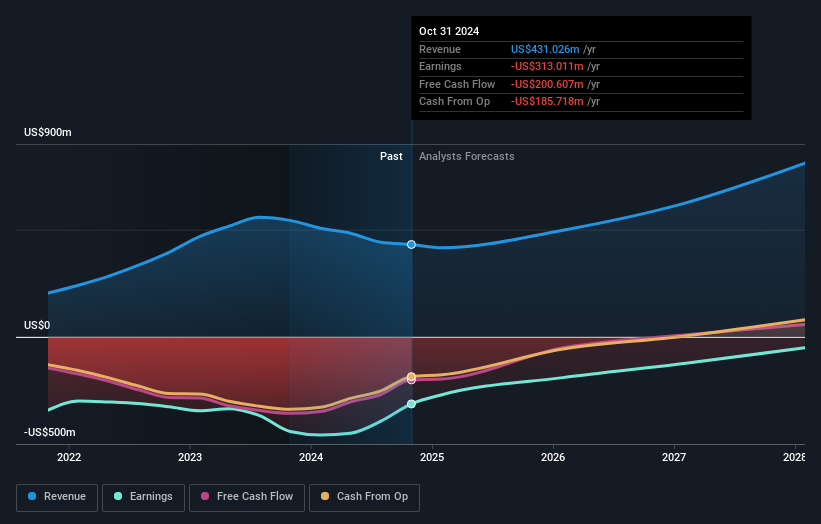- United States
- /
- Electrical
- /
- NYSE:CHPT
Institutions along with retail investors who hold considerable shares inChargePoint Holdings, Inc. (NYSE:CHPT) come under pressure; lose 15% of holdings value

Key Insights
- The considerable ownership by retail investors in ChargePoint Holdings indicates that they collectively have a greater say in management and business strategy
- The top 25 shareholders own 38% of the company
- Recent sales by insiders
A look at the shareholders of ChargePoint Holdings, Inc. (NYSE:CHPT) can tell us which group is most powerful. With 54% stake, retail investors possess the maximum shares in the company. In other words, the group stands to gain the most (or lose the most) from their investment into the company.
While institutions who own 39% came under pressure after market cap dropped to US$408m last week,retail investors took the most losses.
Let's delve deeper into each type of owner of ChargePoint Holdings, beginning with the chart below.
View our latest analysis for ChargePoint Holdings

What Does The Institutional Ownership Tell Us About ChargePoint Holdings?
Institutional investors commonly compare their own returns to the returns of a commonly followed index. So they generally do consider buying larger companies that are included in the relevant benchmark index.
As you can see, institutional investors have a fair amount of stake in ChargePoint Holdings. This implies the analysts working for those institutions have looked at the stock and they like it. But just like anyone else, they could be wrong. When multiple institutions own a stock, there's always a risk that they are in a 'crowded trade'. When such a trade goes wrong, multiple parties may compete to sell stock fast. This risk is higher in a company without a history of growth. You can see ChargePoint Holdings' historic earnings and revenue below, but keep in mind there's always more to the story.

We note that hedge funds don't have a meaningful investment in ChargePoint Holdings. BlackRock, Inc. is currently the largest shareholder, with 7.0% of shares outstanding. With 7.0% and 6.0% of the shares outstanding respectively, The Vanguard Group, Inc. and Quantum Energy Partners, LLC are the second and third largest shareholders.
A deeper look at our ownership data shows that the top 25 shareholders collectively hold less than half of the register, suggesting a large group of small holders where no single shareholder has a majority.
While studying institutional ownership for a company can add value to your research, it is also a good practice to research analyst recommendations to get a deeper understand of a stock's expected performance. Quite a few analysts cover the stock, so you could look into forecast growth quite easily.
Insider Ownership Of ChargePoint Holdings
While the precise definition of an insider can be subjective, almost everyone considers board members to be insiders. Management ultimately answers to the board. However, it is not uncommon for managers to be executive board members, especially if they are a founder or the CEO.
Insider ownership is positive when it signals leadership are thinking like the true owners of the company. However, high insider ownership can also give immense power to a small group within the company. This can be negative in some circumstances.
We can report that insiders do own shares in ChargePoint Holdings, Inc.. It has a market capitalization of just US$408m, and insiders have US$6.6m worth of shares, in their own names. Some would say this shows alignment of interests between shareholders and the board. But it might be worth checking if those insiders have been selling.
General Public Ownership
The general public -- including retail investors -- own 54% of ChargePoint Holdings. This level of ownership gives investors from the wider public some power to sway key policy decisions such as board composition, executive compensation, and the dividend payout ratio.
Private Equity Ownership
With a stake of 6.0%, private equity firms could influence the ChargePoint Holdings board. Sometimes we see private equity stick around for the long term, but generally speaking they have a shorter investment horizon and -- as the name suggests -- don't invest in public companies much. After some time they may look to sell and redeploy capital elsewhere.
Next Steps:
I find it very interesting to look at who exactly owns a company. But to truly gain insight, we need to consider other information, too. Be aware that ChargePoint Holdings is showing 3 warning signs in our investment analysis , you should know about...
Ultimately the future is most important. You can access this free report on analyst forecasts for the company.
NB: Figures in this article are calculated using data from the last twelve months, which refer to the 12-month period ending on the last date of the month the financial statement is dated. This may not be consistent with full year annual report figures.
New: AI Stock Screener & Alerts
Our new AI Stock Screener scans the market every day to uncover opportunities.
• Dividend Powerhouses (3%+ Yield)
• Undervalued Small Caps with Insider Buying
• High growth Tech and AI Companies
Or build your own from over 50 metrics.
Have feedback on this article? Concerned about the content? Get in touch with us directly. Alternatively, email editorial-team (at) simplywallst.com.
This article by Simply Wall St is general in nature. We provide commentary based on historical data and analyst forecasts only using an unbiased methodology and our articles are not intended to be financial advice. It does not constitute a recommendation to buy or sell any stock, and does not take account of your objectives, or your financial situation. We aim to bring you long-term focused analysis driven by fundamental data. Note that our analysis may not factor in the latest price-sensitive company announcements or qualitative material. Simply Wall St has no position in any stocks mentioned.
About NYSE:CHPT
ChargePoint Holdings
Provides electric vehicle (EV) charging networks and charging solutions in the North America and Europe.
Undervalued with adequate balance sheet.
Similar Companies
Market Insights
Community Narratives




